The
PhotoDrama of Creation
Section 9
Huss,
Wycliffe, Tyndale Etc.
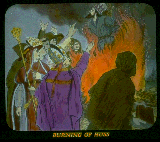
The
lessons of the past should never be forgotten. But we
should cover with a broad mantle of charity much of
its wickedness. The Church early lost the inspired Message,
and unconsciously adopted the error that the teachings
of the Bishops were the equivalent in authority of those
of the Apostles. Through this broad channel grievous
errors swept away precious truths. Lord's Old Roman
World declares, "In the Second Century there were
quiet bishops, intrepid martyrs, who addressed their
flocks in upper chambers, and who held no worldly rank.
The Third Century saw the Church more powerful as an
institution. When Christianity, in the Fourth Century,
became the religion of the court, it was used to support
the very evils against which it originally protested.
The clergy, ambitious and worldly, sought rank and distinction.
They became lazy, arrogant and independent. The Church
was allied with the State, and religious dogmas were
enforced by the sword of the magistrates."
Fortunately
there are always advanced thinkers on all lines. Such
are generally considered fools, and persecuted. In reality
they are the greatest benefactors of mankind. Huss suffered
for his faithfulness to the Bible. Wycliffe and Tyndale
were persecuted. Tyndale's Bible was burned publicly
by high ecclesiastics, in front of St. Paul's Cathedral,
London.
Later
on, Cranmer, Latimer and Ridley, once associated with
the Roman Hierarchy, but subsequently with the English
Hierarchy, were publicly burned, because of their change
of faith. In the light of today we see less difference
between the two Hierarchies. Both Catholics and Protestants
agree in condemnation of the atrocities of the past,
perpetrated in the name of our Redeemer, one of whose
titles is "Prince of Peace," and who admonished,
"Blessed are the peacemakers, for they shall be
called the children of God." Thank God! Our mental
eyes, with clearer light, see greater lengths and breadths
and heights and depths of Love Divine!
Luther,
Zwingli, Melanchthon
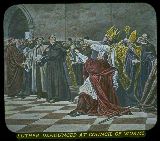
Nobody
today believes that Martin Luther stepped so fully out
in advance of all others that he could be said to have
grasped the Truth, the whole Truth and nothing but the
Truth. Even Lutherans cut two of his Ninety-five Theses,
but wishing to keep the number the same they divided
two others. All agree, however, that about the time
of Luther, civilization took a step forward. Catholics
are better Catholics today, and Protestants better also.
Dr.
Luther was the head of a Catholic College for the instruction
of German youth for the priesthood. He had heard about
the Bible, but like others for thirteen centuries before
him, he trusted in the decisions of the various "Apostolic
Councils" of the Church--the various promulgated
Creeds. These he believed to be Biblical.
But
one day he chanced to see a Latin copy of the New Testament.
His curiosity led him to read it. He was amazed at its
simplicity. He wrote the Pope, suggesting the calling
of a Council to ascertain whether there had been a gradual
digression from the Bible. The Pope did not take the
suggestion kindly. Luther was branded a heretic, unfrocked,
excommunicated. This treatment only convinced him the
more of the difference between the Bible methods and
teachings and the modern ones. He began to write tracts
which he scattered all over Germany, amongst the comparatively
few people then able to read--in any language. Gradually,
through much tribulation, the Bible became more prominent.
Those
holy, honest-hearted Reformers only partially comprehended
the Bible. Much of the smoke of superstition and bigotry
still affected their mental eyes. Nor have we gotten
out of the fog yet. Thank God, however, Bible study
is reviving, influencing people of every denomination.
Let us remember that only the few of old were able to
read. A Bible cost a fortune. It was thought useless
because of erroneous trust in Bishop-Apostles and their
Creeds.
Tetzel
Selling Indulgences
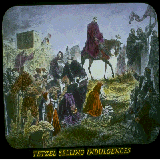
About
the time that Martin Luther began to study the New Testament
and was amazed at its simplicity-- when he was grasping
the great Bible Truth of justification by faith--he
encountered Tetzel. The effect was to convince him the
more that great errors had gradually crept into the
faith and spirit of the Church. Tetzel was selling Indulgences
under the Pope's authority. The proceeds were to be
used in completing St. Peter's Cathedral at Rome.
Tetzel
may or may not have exceeded his authority, but the
record is that he preached, not the merit of Christ's
sacrifice, but the power of the Pope, and of himself,
his agent, saying, You have friends in Purgatory, suffering
there for various sins. The Pope has the power to release
them; I am his agent. Those who donate to this fund
drop their money into this box, assured that the moment
they do so their friends will be released from Purgatorial
suffering.
Catholic
though he still was, and a believer in Purgatory, Luther
could not tolerate such a commercial proposition as
that the grace of God should be purchased with money.
He denounced Tetzel vigorously.
So
far as we are aware, the public sale of Indulgences
has been stopped in most civilized lands, but until
recently in Mexico many Church tables were spread with
Indulgences, specifying various sins and crimes, and
bearing fixed prices.
Protestants,
and some Catholics, have assumed that these Indulgences
are permits to sin. The Church of Rome, however, claims
that they never issue permits to commit sin, but merely
so much remission of Purgatorial sufferings.
Amongst
Bible students today, there seems to be a growing conviction
that the Bible teaches that there is no consciousness
in death--that the awakening moment in the Resurrection
Morning will connect up with the dying thought. The
proof- texts for Purgatory they apply to saints in this
life, to the world's "stripes" in the next
Age, and to the "time of trouble."
The
Holy (?) Inquisition
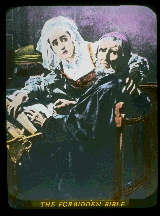
Catholics
and Protestants are inclined to call the doings of the
Inquisition very unholy. Facing the facts charitably,
we remember that it belonged to a less favored day.
With enlightenment, thank God, has come a keener sense
of the Justice and Love which Jesus inculcated: "Love
your enemies, do good to them that hate you and persecute
you and say all manner of evil against you falsely,
for My sake."--Matthew 5:44; Mark 13:13; Luke 6:27.
The
Law given Israel at Mt. Sinai expressed merely Justice
in its command, "Thou shalt love thy neighbor as
thyself." How seriously indeed portions of God's
Word were overlooked in the persecutions of the Inquisition!
Not only was there no love nor sympathy, but Justice
in every sense of the word was violated. Thank God for
the light of a better day!
There
is in the human heart a treacherous disposition to do
evil, if only an excuse for it can be found. As the
Jews found an excuse for crucifying Jesus, stoning Stephen,
etc., so the Inquisitors found an excuse for their persecutions.
Like Saul of Tarsus, they thought they did God service.
Matters have changed greatly, but persecution is still
practised along different lines--ostracism, slander,
boycotting. The Bible refers to this, saying, "Your
brethren which cast you out said, The Lord be glorified!
But He shall appear to your joy, and they shall be ashamed."--Isaiah
66:5.
The
mob spirit, the lynching spirit, is but a less legal
form of "The Holy Inquisition." A Chicago
Methodist Episcopal minister, angered at Prof. Farson,
is quoted by the Indianapolis News and the New York
Tribune as saying: "If I had the power I would
skin that man, salt his hide and tack it on a barn door."
The secular editor of the News says, "If such a
violent outbreak was made by one who preaches the Gospel
of Peace, what may we not expect from the sons of Belial?"
Evidences
multiply that the mob spirit, the Inquisition spirit
is growing. All should be on guard.
Calvin
and Servetus
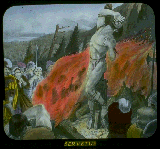
In
Geneva, Switzerland, there was dedicated in 1912 a monument
bearing the following inscription: "In memory of
Michael Servetus--victim of religious intolerance of
his time, and burned for his convictions at Champel,
on September 27, 1553. Erected by the followers of John
Calvin, three hundred and fifty years later, as expiation
for that act, and to repudiate all coercion in matters
of faith."
Thus
have the followers of John Calvin demonstrated to the
world that they have progressed far beyond the teachings
of their leader in the spirit of true Christianity--the
spirit of Justice, of Love. Calvinists deserve congratulations
on their progress, from all Christians--Catholics and
Protestants -all of whom have been making similarly
good progress during the intervening four centuries.
None now would justify Calvin's course in sentencing
Servetus to be burned.
Others
burned at the stake usually had the fuel piled at their
feet. The flames were inhaled with the smoke, and the
victim was speedily unconscious to suffering. For Servetus
Satanic ingenuity arranged the burning fagots at a distance.
He literally roasted alive, in horrible torture, nearly
five hours --in the name of God, of Jesus, of Righteousness,
Truth, Justice, Love, Christianity and Civilization.
It
seems remarkable that only now we are realizing that
a man so deficient in the spirit of his Master as to
murder his brother, should not be an accepted teacher
of the Word of God and its spirit. Only now are Bible
students realizing that Brother Calvin was not the inventor
of the doctrine of Election, but merely of the doctrine
that all the non-elect would suffer everlastingly. Now
we see that the terms, "the Elect," "the
very Elect," are Bible terms! and that those who
make their calling and election sure, will be glorified
in the First Resurrection. Now we see that the Elect
will be associated with Jesus in His Kingdom, which
will bless the non-elect-- "all the families of
the Earth."--Galatians 3:29.
The
Wesleys Mobbed
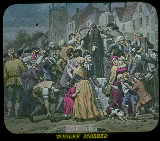
Regret
as we may the multiplied sects of Christendom, we must
look upon them all with sympathy. The establishment
of each, marked a further endeavor to get nearer to
God and the true Light. The Wesleys returned to the
simplicity of the early Church in preaching, Class gatherings,
Bible study, etc. Naturally they were opposed by Churchianity.
Cattle were driven amongst the worshipers to interrupt
their meetings; they were mobbed. Similarly, Baptists,
Presbyterians and others have had their experiences
of persecution, hindering Bible study and worshiping
of God according to their consciences.--2 Timothy 3:12.
"What
manner of persons ought we to be?" As we note the
bitter persecutions of the past, and the "narrow
way" of all who follow Jesus only, we should the
more forgive arrogance and bigotry. All should turn
away from human traditions and everything contrary to
the Bible.--2 Peter 3:11.
Christian
people in all denominations are reaching this conclusion,
and studying God's Word without creedal spectacles,
in Bible classes, or in their homes.--2 Timothy 2:15.
Wesley
uncovered another precious Bible truth. He declared
Calvin's doctrine impossible for his acceptance, as
Calvinists now do. Brother Wesley's theme was Free Grace,
and his favorite text, "The Spirit and the Bride
say, Come, and whosoever will may come and take of the
Water of Life freely." His heart was broad and
loving, but the real breadth of Grace Divine was not
then seen. He did not discern that his beautiful text
relates to the blessing of the non-elect during Messiah's
Reign; that the Church will not become the Bride until
the marriage, at our Lord's Second Coming. Soon after,
the Spirit and the Bride will bid all mankind partake
of life everlasting.
Now
we see the connecting link between Election and Free
Grace. God's Election of a saintly Kingdom class is
the work of this Age. The Elect in glory will in the
next Age extend God's Free Grace to all.--Romans 8:28,29;
Revelation 22:17.
Our
Modern Temples
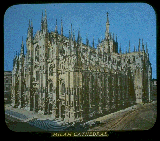
Great
Temples, or Cathedrals, have been erected throughout
the civilized world. Their founders doubtless were inspired
more or less to emulate Solomon and Herod in their great
Temples of the past. No fault need be found with these
from some standpoints. All the circumstances being equal,
it would be a shame for Christians to meet for Divine
worship under conditions inferior to those of their
homes. In many instances, however, the people who have
donated the money for the erection and upkeep of these
buildings have been extremely poor, and have been cajoled
into the expenses by misleading sophistries.
In
the days of Jesus and the Apostles, it was not considered
"Christian work" to raise money for Church
purposes. Today money-raising is the ideal "work
for Jesus." The Apostles taught that the real work
of the Church of Christ is not to build up costly edifices
beyond their means, involving them in debt, but to build
themselves up in the most holy faith. "The Temple
of God is holy, which Temple ye are," "if
so be that the Spirit of Christ dwell in you."
God's people are the living stones under Divine supervision,
being shaped and polished for places in the Glorious
Spiritual Temple. Through that antitypical Temple, God
will send His blessings. The removal of the curse, and
the wiping away of all tears, will follow.
While
using these modern Temples, let us not forget that they
are not the real Temple, or Church. It is composed of
the saints of God, who day by day are seeking to walk
in the footsteps of Jesus, in the service of the Truth,
"doing good to all men as they have opportunity,
especially to the household of faith." If inclined
to criticize our forefathers for building costly Cathedrals
while neglecting the Bible, let us remember that coming
generations may make similar or worse comments on us
for building scores of costly Dreadnaughts for injury
to our fellows. With what shame we will look back upon
our own faults! The thought should make us humble.
Rejected
and Despised
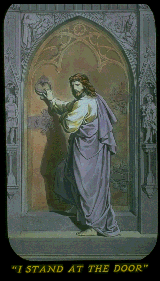
Christ
is here in contrast with the rich, the learned, the
religious and the irreligious of our day--"Christendom."
The Holy Spirit gives "the spirit of a sound mind."
(2 Timothy 1:7.) To sacrifice present interests for
eternal ones is wise. Is it any wonder that artists
represent the world as wealth-mad, glory-mad, pleasure-mad?
The
Christian Herald of a somewhat similar picture, says:
"This allegory--which a critic has aptly called
'A Painter's Sermon'--is applicable to conditions in
every part of the civilized world. It is a picture to
study and to ponder over, that the full import of its
teaching may be understood."
The
Christian Commonwealth of the same, said: "On either
side passes the heedless crowd. A prominent figure is
a priest, proudly conscious of the perfection of the
ritual with which he is starving a higher life. Over
the shoulder of the priest looks a stern-faced divine
of very different type, and, Bible in hand, he turns
to look at the Divine figure. The startled look on the
face of a hospital nurse in the foreground is very realistic.
So absorbed is the man of science with his test-tube
that he never glances at the Christ at his side. One
of the most striking features is that of a false beauty,
hurrying from one scene of pleasure to another. In the
background stands an angel with bowed head, holding
the cup which the world He loved to the death is still
compelling the Christ to drink."
The
passers-by represent the non-elect, whose only hope
lies in the Kingdom of Messiah. The Elect in this picture
are represented in the person of the suffering Savior--members
of the Body of Christ, the Church. "He that despiseth
you despiseth Me." These faithful members of the
Body of Christ are not confined to one denomination,
but constitute the saintly ones of every church and
outside of every human system. They are the "Wise
Virgin" class, being fitted by ignominy for the
Heavenly Kingdom, and its great work of blessing humanity--the
non-elect.
Daniel
in the Critics' Den
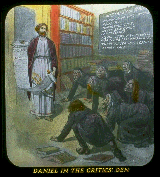
A
master of art has given us a picture which well represents
the attitude of the Higher Critics toward the Book of
Daniel and its wonderful prophecies, which more clearly
than any others point out our day, its present experiences
and what is to be expected. Of course, in discrediting
Daniel and the Prophets, and the Psalms of the Old Testament,
these critics really discredit Jesus and the Apostles.
These Higher Critics of all the great colleges have
undermined faith in the Bible as the Word of God, and
thus undermined all faith in a personal Creator with
many.
These
critics have little to say against Him who spake as
never man spake; but the discerning minds of our day
perceive that as Jesus and the Apostles quoted Daniel
and the Prophets as Divinely inspired, the discrediting
of the one is the rejection of the other. How could
we rely upon the testimony of Jesus and the Apostles
respecting other matters, if they erred respecting the
prophecies of the past?
The
condition of Christendom today is truly deplorable;
and although we can see how it has come about, it seems
almost impossible to restore a faith once lost. Only
the very honest-hearted may we expect will be recovered.
Their deflection had its start with the impossible thought
that all except a handful of humanity must suffer to
all eternity at the hands of fire-proof devils, because
God thus foreknew and arranged matters from before the
foundation of the world. They cast away the Bible because
of the erroneous view that it is the foundation of all
these various religious errors.
This
unbelief advances like a mighty wave, and its influence
is sweeping away all hope respecting a future life.
It is preparing the world for anarchy. The wonder is
that the great and rich, supporting colleges which thus
teach, do not realize that they are bringing anarchy
upon the world.
Even
now, Labor, like the blind giant Samson, is groping
for the pillars whose fall will overthrow present conditions.
"Many
Shall Run To and Fro"
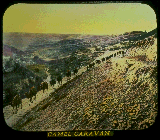
Everybody
knows that stimulated by printing there has been a greater
development of knowledge along every line within the
past century than during the preceding fifty-nine centuries.
Everybody knows that the telegraph, telephone, wireless,
electric lights, gas lights, steam railroads, electric
roads, machinery, conveniences, etc., of our day were
all unknown a century ago.
But
although we know this to be true, it seems almost incomprehensible
to the rising generation. These things have come so
gradually that few realize that they are foregleams
of the great thousand-year Day of Messiah's Kingdom
in which the curse will be fully removed, and instead
the blessing long- promised of God will be outpoured
upon humanity abundantly.
The
Bible declares the coming glory of Earth, when God shall
make the place of His feet glorious, when the whole
Earth shall be a Paradise of God. Our great scientists,
who give no heed to the Bible, testify that present
attainments are as nothing to what is just at hand.
God
describes our day in Daniel's prophecy, saying, In the
Time of the End (of this Age), many shall run to and
fro; knowledge shall be increased; the wise shall understand...
and there shall be a time of trouble, such as never
was since there was a nation.--Daniel 12:1-10; Matthew
24:21.
Are
we not in the midst of the running to and fro which
this prophecy predicted? We must, therefore, be living
today in the period designated the Time of the End--the
time in which this Age will gradually close and the
New Age will gradually dawn with greater blessings.
The first locomotive was built only ninety years ago.
Now, in every land, multitudes are running to and fro,
whose grandfathers probably never traveled fifty miles
from their birthplace. Surely no prophecies could be
more accurately fulfilled than this one.
Who
but God could have known and foretold this marked peculiarity
of our day? Jesus quoted a part of this prophecy.
